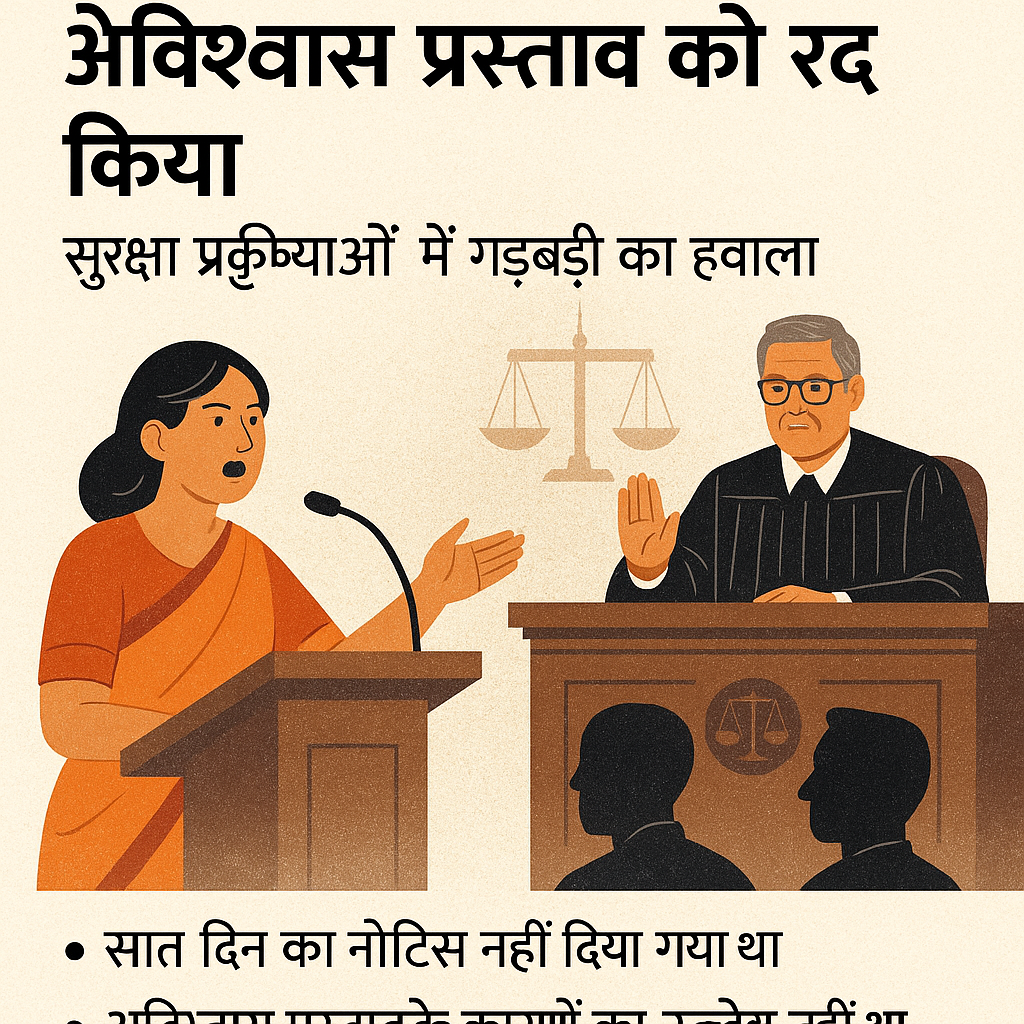Simplified Explanation of the Judgment
The Patna High Court recently ruled in favor of a former Block Pramukh (Chairperson) who challenged her removal from office through a no confidence motion passed in a special meeting of the Block Panchayat Samiti, Mahnar. The court quashed the resolution removing her from office, citing violation of statutory procedural requirements under the Bihar Panchayat Raj Act, 2006.
The petitioner had been elected as the Pramukh of Mahnar Block Panchayat Samiti. After two years of holding office, a no confidence motion was initiated against her. A special meeting was convened on 13 July 2018 by the Executive Officer (respondent no. 6), and in that meeting attended by 11 members, the motion was passed and the petitioner was removed.
The petitioner challenged the resolution primarily on procedural grounds:
- She argued that the requisition for convening the special meeting was not formally presented to her, as required under Section 44(3)(i) of the Act.
- The notice dated 06 July 2018 did not mention the reasons/charges for the no confidence motion.
- The notice also failed to provide the mandatory seven clear days’ notice before the meeting.
The State initially countered by alleging suppression of facts, claiming the petitioner herself had agreed to the 13 July date. However, the Election Commission acknowledged that it was the responsibility of the Executive Officer to ensure compliance with the rules, including the notice period and content.
Ultimately, the High Court found clear violations:
- The notice did not specify the reasons/charges behind the motion, violating Section 44(3)(iv).
- Seven clear days of notice were not given to the elected members, contrary to Section 46(4).
Due to these deficiencies, the Court held that the no confidence motion could not legally stand and therefore set aside the resolution removing the petitioner from office. However, the Court also acknowledged that the petitioner was aware of the motion and its grounds, and therefore directed her to reconvene a valid special meeting within 15 days. If she failed to do so, the Up-Pramukh or one-third of the elected members could take steps to reconvene the meeting lawfully.
Significance or Implication of the Judgment
This decision serves as a strong judicial reminder that procedural safeguards in democratic governance cannot be overlooked. Elected representatives, especially at the Panchayati Raj level, enjoy protection under statutory frameworks designed to ensure fairness and transparency.
For local self-government in Bihar and across India, the ruling underscores the importance of following due process — particularly when it concerns the removal of elected officials. No confidence motions, while constitutionally valid, must be carried out strictly in accordance with the prescribed legal procedures. Failure to comply can render the entire process null and void, as seen in this case.
Legal Issue(s) Decided and the Court’s Decision
- Issue: Was the no confidence motion against the petitioner validly passed?
- Decision: No. The resolution was quashed due to procedural irregularities in issuing notice.
- Issue: Were the mandatory legal requirements under Sections 44(3)(iv) and 46(4) of the Bihar Panchayat Raj Act, 2006 followed?
- Decision: No. The notice failed to mention reasons/charges and did not provide seven clear days.
- Issue: What should happen next since the petitioner is aware of the no confidence motion?
- Decision: Petitioner must convene a fresh meeting within 15 days. Failing which, others may lawfully proceed
Judgments Relied Upon or Cited by Court
- Bihar Panchayat Raj Act, 2006: Sections 44(3)(i), 44(3)(iv), and 46(4)
Case Title
Sheela Devi vs The State of Bihar & Ors.
Case Number
CWJC No. 14023 of 2018
Citation(s)
2020 (1) PLJR 74
Coram and Names of Judges
Hon’ble Mr. Justice Ashwani Kumar Singh
Names of Advocates and who they appeared for
- Mr. S.B.K. Manglam and Mr. Ravi Ranjan, Advocates for the petitioner
- Mr. Anwar Karim, A.C. to GP10 for the State
- Mr. Amit Shrivastava and Mr. Girish Pandey, Advocates for the State Election Commission
- Mr. S.P. Srivastava and Mr. Arun Kumar, Advocates for the private respondents
Link to Judgment
https://patnahighcourt.gov.in/viewjudgment/MTUjMTQwMjMjMjAxOCMxI04=-3dWhx6s85A0=
If you found this explanation helpful and wish to stay informed about how legal developments may affect your rights in Bihar, you may consider following Samvida Law Associates for more updates.








